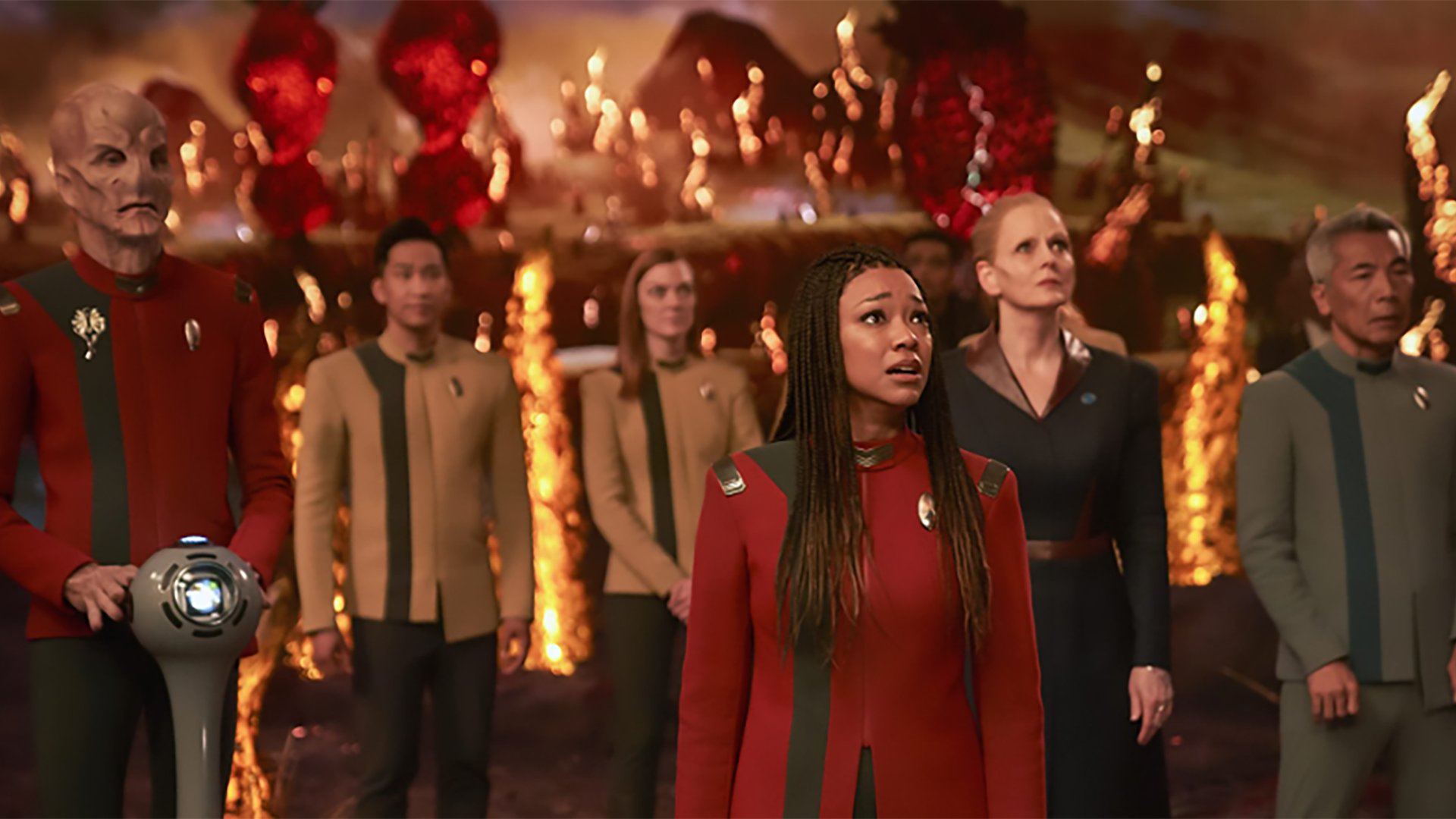By Brandon T. McClure (@btmcclure @fakenerdpodcast)
Initially developed for CBS All Access, Star Trek: Discovery launched in 2017 and ushered in a new era for the long-dormant Star Trek franchise. Since then, four seasons of Star Trek: Discovery have aired and its success has launched four (five if you count Star Trek: Short Trecks) other Star Trek shows including Star Trek: Lower Decks and Star Trek: Picard. For lack of a better term, Star Trek has been experiencing a new golden age. But Paramount+ decided to end its flagship Star Trek show with its upcoming fifth season, which paints a worrying picture when paired with Star Trek: Picard ending after its third season.
Star Trek: Discovery was announced in 2015 and was originally developed by Brian Fuller and Alex Kurtzman. Rumors suggest that the show was intended to be anthological in nature which meant every season would follow a new crew at various points in the Star Trek timeline. Eventually, Fuller left the project due to creative differences and was replaced by Gretchen J. Berg and Aaron Harberts. Akiva Goldsman provided support for the first season but eventually left to develop Star Trek: Strange New Worlds. After the first season, Star Trek: Discovery would see creative shuffles between almost every season. For example, Berg and Harberts were fired during the production of the second season and Alex Kurtzman replaced them as showrunner. Speculation surrounding this move suggested it was because Kurtzman knew his upcoming reboot of The Mummy was going to flop. During the third season, Kurtzman was joined by Michelle Paradise, who eventually took over as the sole showrunner for the fourth and upcoming fifth season.
Saru (Doug Jones), Captain Michael Brown (Sonequa Martin-Green) and Discovery Crew in Star Trek: Discovery.
Star Trek is well known for being an episodic adventure series that deals with philosophical and political questions but Star Trek: Discovery decided to break the traditional mold in order to bring the franchise into the streaming age. Television has changed drastically since Star Trek: Enterprise went off the air in 2005. The seasons are shorter, the budgets are higher, and serialized television has taken over streaming services. So in order to bring the series to the streaming age, Star Trek: Discovery told the story of Michael Burnham, Spock's half-sister played by Sonequa Martin-Green, who gets recruited to the USS Discovery during the first year of the Klingon-Federation war. The series was set around ten years before the events of Star Trek: The Original Series but eventually moved to the 32nd century due to some time travel shenanigans.
During its run, Star Trek: Discovery has had to deal with a certain amount of trolling from a segment of the online Star Trek fandom. While many of the newer Star Trek show dealt with people claiming that none of it was “real Trek”, Star Trek: Discovery got the brunt of it due, in part, to it being the most progressive of the shows. At the end of every season, right-wing and spiteful YouTube personalities would claim that “inside sources” are saying the show was going to get canceled, only for the show to get renewed. Fans of Discovery also received an unfair amount of harassment just for being fans of “NuTrek”. While the “wrong” side of the Trek fandom is celebrating this cancellation, the show's fans are mourning it and preparing for a barrage of unearned victory laps.
Saru (Doug Jones), Captain Michael Burnham (Sonequa Martin-Green) and Captain Gabriel Lorca (Jason Isaacs) in Star Trek: Discovery.
Recently Paramount announced that they were going to put less money into Paramount+, which is echoing many streaming services at the moment. It’s not hard to see that the streaming bubble may be about to pop, with almost every service bleeding money with very little coming in. Paramount+ recently lost a few subscribers just before Star Trek: Picard began its third season. All this begins to paint a pretty reasonable picture for Star Trek: Discovery’s cancelation considering it’s a particularly expensive show. These days, it’s difficult for streaming shows to make it past three seasons so Star Trek: Discovery making it to five is by no means anything to scoff at. It’s unlikely any of the current shows reach the seven seasons that the 90s shows did.
With the news that Star Trek: Discovery will be canceled, also came the news that it will premier in 2024 and undergo a certain amount of reshoots. These reshoots are going to allow the season finale to serve as a series finale. It’s lucky that Paramount+ decided to do this since it would give fans the closure they need for these characters they’ve come to love. So many shows, especially streaming shows are left with cliffhanger endings that will never get resolved. Unfortunately, it never felt like Star Trek: Discovery lived up to its potential when it made the jump to the 32nd century. Exploring an era of the Star Trek timeline that had never been explored before should have provided the writers with plenty of new material. But it began to feel restrained by its serialized format and the 32nd century it left largely unexplored. For this reason, it’s hard not to feel upset by the news of this cancelation.
What’s more worrying is the state of the Star Trek franchise moving forward. With Star Trek: Picard ended after its third season wraps up, and now the news of Star Trek: Discovery, the franchise only has one live-action show left. The fan-favorite Star Trek: Strange New Worlds is all but guaranteed to receive a third season, but many are wondering, will Star Trek’s future ly in animation. As far as the future of the franchise, the only guaranteed new project is a scripted podcast based on scripts for a canceled Khan TV series. Other than that, there are only two rumored shows and a guarantee from Alex Kurtzman that there are more coming. Star Trek Day is coming around in April, so there may be some announcements. Star Trek: Lower Decks and Star Trek: Prodigy have upcoming seasons, so all is not lost. But one wonders if this is the beginning of the end of Star Trek’s new golden age.



